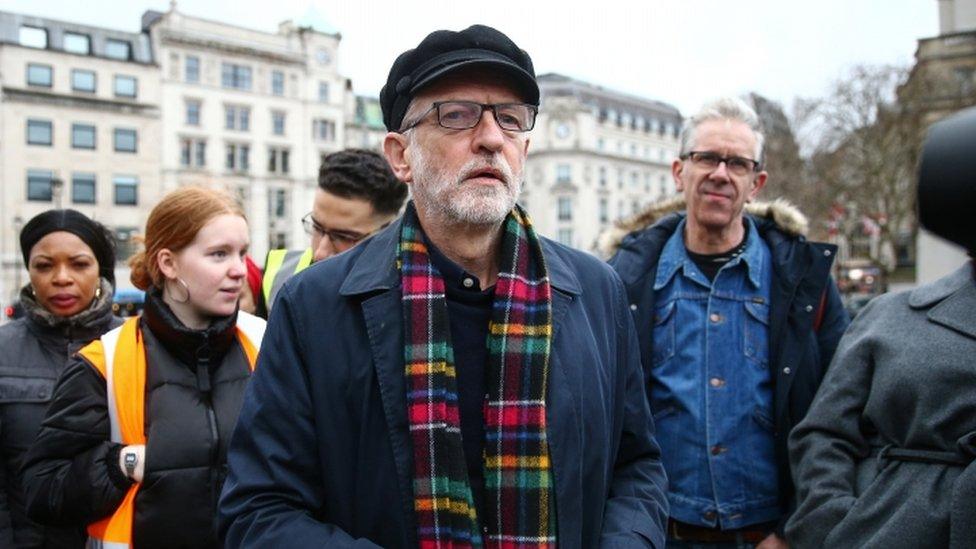Labour MSP 'ashamed of party' over anti-Semitism
- Published

Mr Johnson said Labour "actions and inaction" had caused pain, hurt and fear in the Jewish community
A Labour MSP has said that the level of anti-Semitism within the party had made him "ashamed" to be a member.
Daniel Johnson claimed that Labour had "failed the Jewish people" in recent years.
And he criticised the party over its handling of complaints and its "reluctance" to adopt the IHRA definition of anti-Semitism.
Mr Johnson said Labour now had a duty to "put things right", and he believes it will.
He was speaking as the Scottish Parliament marked Holocaust Memorial Day and the 75th anniversary of the liberation of the Auschwitz concentration camp.
Labour has been plagued by allegations of anti-Semitism since Jeremy Corbyn - a long-standing supporter of Palestinian statehood - became leader in 2015.
There have been claims that anti-Semitic tropes were being widely shared on social media by Labour activists, while a number of high-profile figures including MPs Naz Shah and Chris Williamson and former London mayor Ken Livingstone have been suspended over alleged anti-Semitic comments.
During last month's general election campaign, Mr Corbyn again apologised for incidents of anti-Semitism within Labour after the Chief Rabbi, Ephraim Mirvis, claimed "a new poison - sanctioned from the very top - had taken root" in the party.

Jeremy Corbyn has insisted there is no place for anti-Semitism within the Labour party
Speaking in the Holyrood chamber, Mr Johnson said Labour was "supposed to be the party of equality, of social justice and of human rights" but had failed to be so in recent months and years - and had failed the Jewish people in particular.
The MSP for Edinburgh Southern said he had reached out to the Jewish community in the city to discuss and listen to their concerns, and had been struck by the "pain, hurt and fear our actions and inactions have caused".
He added: "Our failure to deal with complaints. Our readmission of members guilty of anti-Semitism. Our reluctance to adopt the IHRA definition of anti-Semitism.
"In my 25 years of being a member of the Labour party, there are things the party has done that I've disagreed with. There are things the party have done that have made me angry.
"But these events and these conversations that I have held are the first time in all those years I have ever felt ashamed to be a Labour party member."
Mr Corbyn has insisted on many occasions that there is no place for anti-Semitism in Labour, with some of his supporters saying the problem has been exaggerated and is being used as a stick to beat the Labour leader by people who do not like him or his views on the Middle East.
What is anti-Semitism?
Jewish people have faced prejudice and hostility for centuries. During World War Two, six million Jews were murdered by the Nazis or their accomplices in what is known as the Holocaust.
Modern-day anti-Semitism can take many forms including, but not limited to, conspiracy theories about Jewish control of the global financial system and the media, to attacks on synagogues, verbal abuse or hate speech and abusive memes on social media.
In 2018, anti-Semitic hate incidents in the UK reached a record high, according to the Community Security Trust, which monitors them.
In 2016, the International Holocaust Remembrance Alliance (IHRA) adopted a working definition of anti-Semitism which described it as "a certain perception of Jews, which may be expressed as hatred toward Jews".
The UK and the IHRA's other 30 members accepted the definition, as well as a series of accompanying "contemporary" examples of how anti-Semitism manifests itself in public life.
These include Holocaust denial, denying the Jewish people their right to self-determination (through the existence of the State of Israel), and holding Jews collectively responsible for the actions of that state.
In July 2018, Labour adopted a new anti-Semitism code which critics, including Jewish leaders and some Labour MPs, said fell unacceptably short of the IHRA definition.
Following a consultation - and widespread criticism - Labour subsequently adopted the full IHRA definition and examples, along with an accompanying statement that "this will not in any way undermine freedom of expression on Israel or the rights of Palestinians".
Critics have said the addition of a "caveat" undermines the IHRA definition - but Labour says it is intended to reassure members they can be critical of Israel without being anti-Semitic.